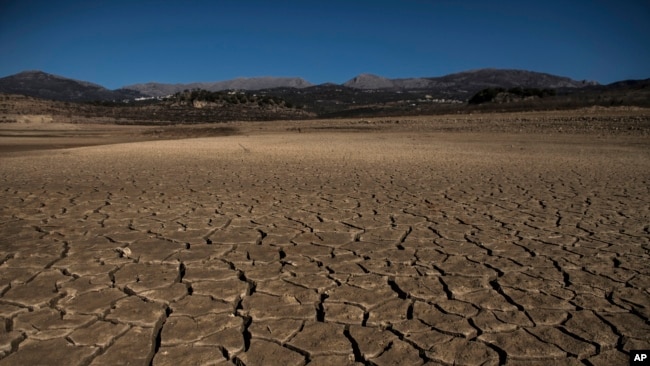the report’s message is “that for many, now the time is already adapt or die.”
“The cost of inaction is much higher than the cost of action."
まさにその通りだと思います。
今年は平年よりも暑い夏との予測が出ていますね。
思えば、私には昨年は日の出の光さえとても暑く感じ、一日中エアコンをつけ、引きこもり生活でした。
今年はそこに石油高による電気代の高騰、食糧危機。
世界はカオス!!
南欧の干ばつと水不足(和訳)
Droughts, Less Water in Southern Europe
March 07, 2022
スペイン南部のラ・ビヌエラで、雨不足のため乾燥しているビヌエラ貯水池の一部が見える(2022年2月22日)。世界的な気温上昇が続く中、農業の収量低下と水資源の減少が重要なリスクとなっている。(AP写真/Carlos Gil)
南ヨーロッパは水危機に直面しており、特に農業では食糧生産量の減少につながる可能性があります。
世界的な気温の上昇が続く中、ヨーロッパにおける農業生産の減少や水資源の減少は将来の危険であると、世界トップの気候科学者が述べています。
スペインは記録的な乾燥の冬を迎えています。南部グラナダ県の農家、フアン・カマーチョさんは、「我々はdrastic な状況に直面している 」と言っています。
Drastic とは、深刻な、厳しいという意味の言葉です。
カマチョさんの土地からそう遠くないところにあるこの地域最大の貯水池は、2ヶ月以上一滴の雨も降らず、容量の15%にまで低下しています。
ポルトガルでは、冬の異常な干ばつに見舞われ、当局は水力発電や灌漑のための貯水池の利用を制限しています。
ホアキン・モンテスさんは、さらに損失を被ることになる人たちの一人です。彼は、4億4,000万人の国民を養うEUの約1,000万人の農民の1人です。
スペイン南部のコスタ・デル・ソルとシエラネバダ山脈の間に位置するモンテスさんの土地には、本来なら十分な水があるはずでした。
しかし、10月以降の雨量が平均より41%も少ないため、ダムにはほとんど水がありません。農家が夏を越せるはずの−池などの−私的な水源は空っぽです。
「私たち農民は、干ばつには慣れています」と、14歳のときに父親からこの仕事を教わったモンテスさんは言います。「でも、年々雨が少なくなっていて、私は自分の生活が心配です。」
IPCC報告書
国連の「気候変動に関する政府間パネル」が今週発表した報告書によると、ヨーロッパでは高熱や洪水、農業損失や水不足が発生することが示唆されています。
猛暑、洪水、干ばつはインフラにダメージを与え、エネルギーと水の需要を増加させると、報告書は警告しています。
ヨーロッパでは、世界平均を上回る速さで温暖化が進むため、専門家は大陸が分裂している様子を描いています。南部はますます乾燥し、北部は地中海性気候になり、作物生産と森林の成長が増加する可能性があるが、それなりのリスクも伴うと指摘しています。
レイチェル・リッカー氏はUnion of Concerned Scientists(憂慮する科学者同盟)の気候専門家です。彼女はAP通信に「野菜や温暖な気候の作物は、短期的には恩恵を受けるかもしれません」と語っています。
「輸出され、多くの経済の基礎を形成する主要な作物は、悪影響を受ける可能性が高いのです」と、彼女は付け加えます。
環境保護主義者は、伝統的な作物から、より多くの水を必要とし、より高い利益をもたらす作物へと切り替えた土地所有者が問題の一端を担っていると言います。アボカドやマンゴーなどの工業的な単一作物栽培が、小規模で伝統的な農場に取って代わったのです。
ロッテルダムに拠点を置くグローバル・センター・オン・アダプテーションのパトリック・フェルコイエン氏は、この報告書のメッセージは「多くの人にとって、今はもう適応するか死ぬかの時である」というものだと述べています。
さらに、彼は「何もしないことのコストは、行動することのコストよりもはるかに高い」とも述べています。
South
Droughts, Less Water in Southern Europe
Southern Europe is facing a water crisis that could lead to a decrease in food production, especially in agriculture.
Decreasing agricultural production in Europe and reduced water resources are future dangers as worldwide temperatures continue to rise, the world’s top climate scientists say.
Southern Europe
Spain is facing one of the driest winters on record. Juan Camacho, a farmer in the southern province of Granada, said, “We are facing a drastic situation.”
Drastic is a term that means serious or severe.
Not far from Camacho’s land, the area's largest reservoir is down to 15 percent of its capacity after over two months without a drop of rain.
In Portugal, authorities have restricted the use of some reservoirs for hydroelectric power and irrigation as the country experiences an unusual winter drought.
Joaquín Montes is among those set to lose more. He is one of about 10 million farmers in the European Union who feed some 440 million people.
Located between Costa del Sol and the Sierra Nevada mountains in southern Spain, Montes’ land should have plenty of water.
But with 41 percent less rain than average since October, dams contain almost no water. Private sources of water - such as ponds - that are supposed to last farmers through summer are empty.
“Us farmers, we are used to dealing with drought,” said Montes, who learned the job from his father when he was 14. “But every year we see less and less rain. I fear for my livelihood.”
IPCC report
A report this week by the United Nations’ Intergovernmental Panel on Climate Change suggested that Europeans will experience high heat and flooding as well as agricultural losses and water scarcity.
Extreme heat, floods and droughts will lead to infrastructure damage and increased energy and water demands, the report warned.
As warming rises faster in Europe than the worldwide average, experts painted a picture of a divided continent. They suggest that the south would become increasingly dry and the north could take on a Mediterranean climate that might provide some increased crop production and forest growth, but with risks of its own.
Rachel Licker is a climate expert at the Union of Concerned Scientists. She told The Associated Press “There are some vegetables and warm climate crops that might see benefits in the short term.”
“The major crops that are exported and really form the basis of a lot of the economy are the ones that are likely to be negatively affected,” she added.
Environmentalists say landowners who switched from traditional crops to those that demand more water and bring higher profits are part of the problem. Industrial, single-crop farming for avocados or mangoes have replaced smaller, traditional farms.
Patrick Verkooijen of the Rotterdam-based Global Center on Adaptation said the report’s message is “that for many, now the time is already adapt or die.”
He added, “The cost of inaction is much higher than the cost of action."
Words in This Story
reservoir – n. a usually artificial lake that is used to store a large supply of water for use in people's homes, in businesses, etc.
capacity – n. the ability to hold or contain people or things — usually singular
irrigation – n. the act of supplying (something, such as land) with water by using artificial means (such as pipes)
drought – n. a long period of time during which there is very little or no rain
scarcity – n. a very small supply : the state of being scarce
infrastructure – n. the basic equipment and structures (such as roads and bridges) that are needed for a country, region, or organization to function properly
benefit – n. a good or helpful result or effect
